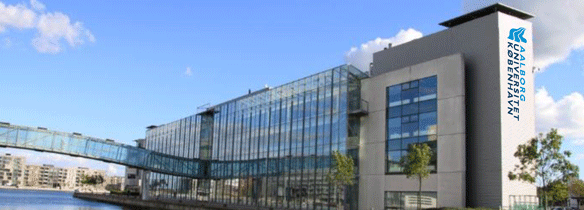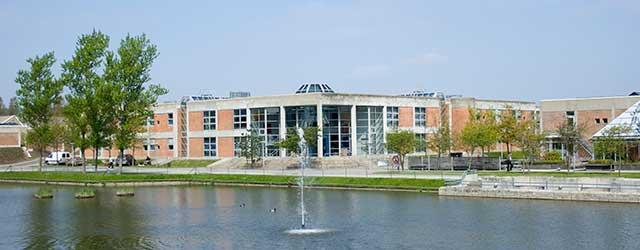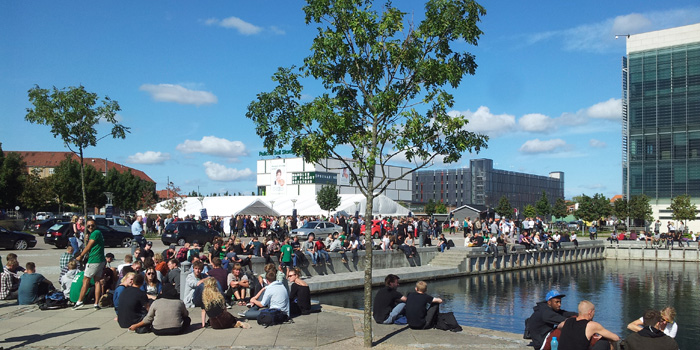Aalborg University (AAU) has been providing students with academic excellence, cultural engagement and personal development since its inception in 1974. It offers education and research within the fields of natural sciences, social sciences, humanities, technical and health sciences.
AAU currently consolidates and further develops its profile as a dynamic and innovative research and educational institution oriented towards the surrounding world. Over the past three years the university has experienced a 50% increase in earnings from the university's cooperation with external partners. In 2013 Aalborg University received external funding well above 100,000,000 Euro, which was approx. 22% of the university's total income.
AAU is characterised by combining a keen engagement in local, regional, and national issues with an active commitment to international collaboration. With a persistent dedication to the pursuit of excellence, Aalborg University offers supreme educational experiences across a broad spectrum of academic fields.
STUDENT FACTS AND FIGURES
Aalborg University awards Bachelors, Master's, Ph.D. and Doctoral degrees in various fields within the different programmes, institutes and centres. In 2013 180 students received a Ph.D. degree.
More than 19.000 students are enrolled at Aalborg University, ranging from students at preparatory courses through doctoral-level candidates. Approximately 4.900 students are enrolled at the Faculty of Humanities, 5.577 students at the Faculty of Social Sciences and 8.600 at the Faculty of Engineering, Science and Medicine.
13% of the total number of enrolled students are international students. 61,1 % are from European countries, 14,7 % from the Nordic countries and 9,4 % from Asia.
THE PBL-BASED PEDAGOGICAL MODEL
The main teaching and study form at AAU is problem based and project organised learning (PBL). This “Aalborg PBL Model" builds bridges between the various approaches to teaching, research and innovation, and it connects students and researchers.
The study programmes at Aalborg University are characterized by problemsolving groupwork centered on authentic projects, often solved in cooperation with the business world. Besides giving the students the chance to apply theory to real-life issues, PBL provide graduates with unique competences in teamwork and in working analytically and result oriented – competences highly values by employers.
The PBL-based pedagogical model of the University has become both nationally and internationally recognised by universities, researchers and students as an advanced and efficient learning model. Thus, UNESCO has placed its only Danish Chair in PBL at Aalborg University.
Aalborg University stands out in the university sector with a low dropout- and a high completion rate. The PBL-based pedagogical model is one of the most important causes for this. At Aalborg University the students are in close contact with their teachers and supervisors throughout the semester, and the students are mutually accountable for the written project with their fellow group members, which together makes the students demonstrate a high level of self-motivation and personal responsibility for learning.
KNOWLEDGE FOR THE DEVELOPMENT OF SOCIETY
As well as generating new knowledge, the efforts of researchers to create research-based teaching at AAU play a central role in fulfilling the vision of contributing knowledge of importance and relevance to the development of society towards greater sustainability in terms of resource management, the environment and social responsibility.
This commitment on the part of AAU researchers combines with research-oriented teaching to produce graduates who are highly qualified and ready for the labour-market, as well as research-based and value-adding innovation that is interesting, surprising, and relevant.
RESEARCH AT THE AAU FACULTY OF SOCIAL SCIENCES
AAU's Faculty of Social Sciences prioritises and has developed a high profile in fields such as economic and social dynamics, health economics, efficient production processes, business models, organisational development and learning, innovation and IT-management in both private and public companies.
Other specific areas of research include the labor market, the welfare state and the development of public governance, evaluation, IT-driven innovation, public and civil law, criminology and analytical policing, social work, working life, broader sociological issues, gender studies, history, cultural production, transnational relations, pedagogy, social psychology and learning.
RESEARCH AT THE AAU FACULTY OF ENGINEERING AND SCIENCE
Research at the Faculty of Engineering and Science at AAU focuses on creating the basis for more effective, robust and sustainable solutions to central problems that will face tomorrow’s society. The largest area of action encompasses the full breadth of ICT in the fields of computer science, electronic systems, power electronics, manufacturing, energy, materials, robotics, bioinformatics and transport.
In addition, priority is given to the whole range of engineering fields (including material technology, biotechnology, and nanotechnology) and to cross-cutting initiatives in the fields of design, social planning and conversion.
Graduate Programs:
DANISH B LEVEL IN ENGLISH COMPARES TO:
IELTS (academic test): 6.5 or
TOEFL (paper-based): 560 or
TOEFL (internet-based): 88 or
Cambridge Certificate of Proficiency (CPE)
Certificate in Advanced English (CAE)
Cambridge First Certificate with the grade B
DANISH A LEVEL IN ENGLISH COMPARES TO:
IELTS (academic test): 7.0 or
TOEFL (paper-based): 600 or
TOEFL (internet-based): 100 or
Cambridge Certificate of Proficiency (CPE)
Certificate in Advanced English (CAE) with the grade B



2014 © a2fairs. All Rights Reserved. powered by twopulse.com